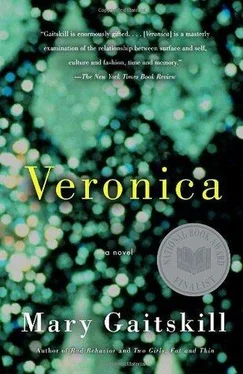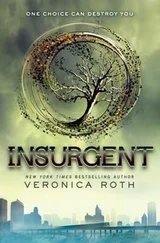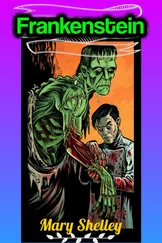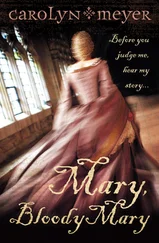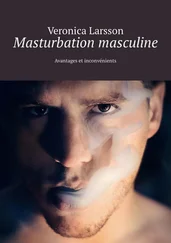Mary Gaitskill - Veronica
Здесь есть возможность читать онлайн «Mary Gaitskill - Veronica» весь текст электронной книги совершенно бесплатно (целиком полную версию без сокращений). В некоторых случаях можно слушать аудио, скачать через торрент в формате fb2 и присутствует краткое содержание. Год выпуска: 2006, Издательство: Vintage, Жанр: Современная проза, на английском языке. Описание произведения, (предисловие) а так же отзывы посетителей доступны на портале библиотеки ЛибКат.
- Название:Veronica
- Автор:
- Издательство:Vintage
- Жанр:
- Год:2006
- ISBN:нет данных
- Рейтинг книги:5 / 5. Голосов: 1
-
Избранное:Добавить в избранное
- Отзывы:
-
Ваша оценка:
- 100
- 1
- 2
- 3
- 4
- 5
Veronica: краткое содержание, описание и аннотация
Предлагаем к чтению аннотацию, описание, краткое содержание или предисловие (зависит от того, что написал сам автор книги «Veronica»). Если вы не нашли необходимую информацию о книге — напишите в комментариях, мы постараемся отыскать её.
Veronica — читать онлайн бесплатно полную книгу (весь текст) целиком
Ниже представлен текст книги, разбитый по страницам. Система сохранения места последней прочитанной страницы, позволяет с удобством читать онлайн бесплатно книгу «Veronica», без необходимости каждый раз заново искать на чём Вы остановились. Поставьте закладку, и сможете в любой момент перейти на страницу, на которой закончили чтение.
Интервал:
Закладка:
You. You . When I knew Veronica, I was healthy and beautiful, and I thought I was so great for being friends with somebody who was ugly and sick. I told stories about her to anybody who would listen. I can just hear my high, clear voice describing her antics, her kooky remarks. I can hear the voices of people congratulating me for being good. For being brave.
I drag the bucket across the room. Rain hits the dirty windows in great strokes. The people outside are blurred and runny: a middle-aged woman trying to pull a teenage girl under an umbrella, the girl pulling back and yelling. A car swishes around the corner, filling a fat wet drop with a second of headlight. The girl breaks away and runs into the rain. I think of the Mexican woman with rain running down her face. I spray the window and rub.
Now I’m ugly and sick. I don’t know how long I’ve had hepatitis — probably about fifteen years. It’s only been in the last year that the weakness, the sick stomach, and the fever have kicked up. Sometimes I’m scared, sometimes I feel like I’m being punished for something, sometimes I feel like I’ll be okay. Right now, I’m just glad I don’t have to deal with a beautiful girl telling me I have to learn to love myself.
I stretch up to the top window and breathe into the pain, like it’s a wall I can lean against.
When I say that the songs we listened to at the hostel had a feeling of sickness in them, that doesn’t mean I don’t like them. I did like them, and I still do. The sick feeling wasn’t in all the songs, either. But it was in many songs, and not just the ones for teenagers; you could go to the supermarket and hear it in the Muzak that roamed the aisles, swallowing everything in its soft mouth. It didn’t feel like sickness. It felt like endless opening and expansion, and pleasure that would never end. The songs before that were mostly about pleasure, too — having it, wanting it, or not getting enough of it and being sad. But they were finite little boxes of pleasure, with the simple surfaces of personality and situation.
Then it was like somebody realized you could take the surface of a song, paint a door on it, open it, and walk through. The door didn’t always lead to someplace light and sweet. Sometimes where it led was dark and heavy. That part wasn’t new. A song my father especially loved by Jo Stafford was “I’ll Be Seeing You.” During World War II, it became a lullaby about absence and death for boys who were about to die and kill. I’ll be looking at the moon, but I’ll be seeing you . In the moonlight of this song, the known things, the tender things, “the carousel, the wishing well,” appear outlined against the gentle twilight of familiarity and comfort. In the song, that twilight is a gauze veil of music, and Stafford’s voice subtly deepens, and gives off a slight shudder as she touches against it. The song does not go any further than this touch because beyond the veil is killing and dying, and the song honors killing and dying. It also honors the little carousel. It knows the wishing well is a passageway to memory and feeling — maybe too much memory and feeling, ghosts and delusion. Jo Stafford’s eyes on the album cover say that she knew that. She knew the dark was huge and she had humility before it.
The new songs had no humility. They pushed past the veil and opened a window into the darkness and climbed through it with a knife in their teeth. The songs could be about rape and murder, killing your dad and fucking your mom, and then sailing off on a crystal ship to a thousand girls and thrills, or going for a moonlight drive. They were beautiful songs, full of places and textures — flesh, velvet, concrete, city towers, desert sand, snakes, violence, wet glands, childhood, the pure wings of night insects. Anything you could think of was there, and you could move through it as if it were an endless series of rooms and passages full of visions and adventures. And even if it was about killing and dying — that was just another place to go.
When I still lived at home, I had to share a room with my sisters, Daphne and Sara. Two of us would share a huge bed with a giant headboard, and the third had half a bunk bed to herself on the other side of the room. We rotated to be fair. The good thing about the single bed was that it felt more mature, and that the wall above it had special cardboard cutouts our mom had made of huge-eyed dancing teens in short skirts and boots. Plus, you could masturbate privately, without having to carefully lift the blankets off your working arm and stiffen up to keep the mattress from shaking — and still wonder if your sister knew what you were doing. But if you shared the big bed, there was the fun of shutting out the third, giggling and whispering secrets under the blankets while the loner hissed, “Shut up!” Sometimes it felt better not to have to touch legs and butts together. Other times it was good to have your back right against your sister’s back, especially if she was asleep and you could feel her presence without her feeling yours.
We also had to take turns sharing the record player. Daphne and Sara didn’t like the music I liked — they still liked the old kind recorded on 45s. They’d pretend to be go-go dancers, dancing on the tiny green chairs we’d sat in as little kids to eat peanut butter from teacups. Sometimes when they danced, I’d roll my eyes and hunch up over a book or storm out. But sometimes I’d jump up on a green chair and yell, “I’m Roxanne!” after the most beautiful dancer on Hullabaloo . Daphne would yell, “I’m Linda!” and Sara would yell, “I’m Sherry!” even though whenever Sherry came on the TV, my father said, “There’s that big fat girl again.” Then we’d go wild dancing for as long as the record lasted.
My music was more private, and I didn’t play it loudly. I crouched down by it, sucking it into my ears, tunneling into it at the same time. Daphne sprawled on her bed, reading, and Sara maybe played one of her strange games with miniature animals, talking to herself softly in different animal voices. Downstairs, my father watched TV or listened to his music while my mother did housework or drew paper clothes for the cardboard paper dolls she still made for us, even though we no longer played with them. I loved them like you love your hand or your liver, without thinking about it or even being able to see it. But my music made that fleshly love feel dull and dumb, deep, slow, and heavy as stone. Come, said the music, to joy and speed and secret endlessness, where everything tumbles together and attachments are not made of sad flesh.
I didn’t know it, but my father was doing the same thing, sitting in his padded rocking chair, listening to opera or to music from World War II. Except he did not want tumbling or endlessness. He wanted more of the attachment I despised — he just didn’t want it with us. My father had been too young to enlist when World War II started; his brother joined the army right away. When my dad was finally old enough to enlist in the navy, he sent his brother a picture of himself in his uniform with a Hawaiian girl on his lap; he wrote, “Interrogating the natives!” on the back. A week before the war ended, it was returned to my father with a letter saying his brother was dead. Thirty years later, he was a husband, father, and administrator in a national tax-office chain. But sometimes when I walked past him sitting in his chair, he would look at me as if I were the cat or a piece of furniture, while inside he searched for his brother. And through his brother, his mother and father. And through them, a world of people and feelings that had ended too abruptly and that had nothing to do with where he was now. He wasn’t searching for memories; he already had them. He wanted the physical feel of sitting next to his brother or looking into his eyes, and he was searching for it in the voices of strangers that had sung to them both a long time ago. I was so attached to my father that I felt this. But I felt it without knowing what it was, and I didn’t care enough to think about it. Who wants to think about their liver or their hand? Who wants to know about a world of people who are dead? I was busy following the music, tumbling through my head and out the door.
Читать дальшеИнтервал:
Закладка:
Похожие книги на «Veronica»
Представляем Вашему вниманию похожие книги на «Veronica» списком для выбора. Мы отобрали схожую по названию и смыслу литературу в надежде предоставить читателям больше вариантов отыскать новые, интересные, ещё непрочитанные произведения.
Обсуждение, отзывы о книге «Veronica» и просто собственные мнения читателей. Оставьте ваши комментарии, напишите, что Вы думаете о произведении, его смысле или главных героях. Укажите что конкретно понравилось, а что нет, и почему Вы так считаете.
